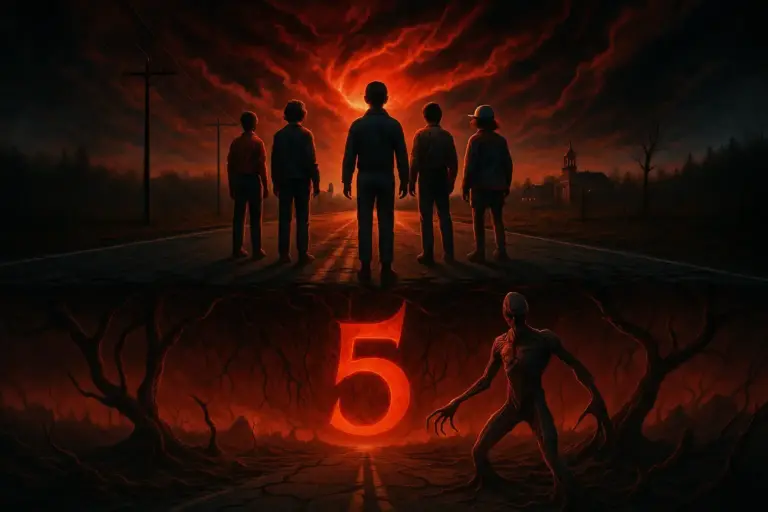Imagine this: You finish a new drama on Friday. By Sunday, your group chat explodes. No spoilers needed — everyone’s already done! Welcome to 2025, where the hottest watercooler talk revolves around television’s lightning-fast, self-contained wonders: the limited series.
Just last spring, Nielsen clocked a staggering 18 out of the top 30 streaming titles as single-season stories. It makes you wonder, right? Why the sudden binge of shows that say “once and done”? Why is everyone buzzing about a seven-episode chess drama, but nobody begging for Season 2? Grab your popcorn (make it a small, trust me) and let’s pull back the curtain on the limited-series boom.

What’s With All the “Limited” Love?
Okay, first: what even is a limited series? Think of it as the TV equivalent of a novella — sharp, focused, punchy. It’s not a miniseries (your grandma’s word for 70s melodrama) or an anthology (where every season resets, like a box of chocolates for the genre crowd). A true limited series comes as a single serving. Four to ten episodes. Self-contained. The whole story, wrapped up before your takeout goes cold.
The Emmys even had to catch up. Since 2011, they’ve defined and celebrated these miniseries-turned-limited-series (and, since 2021, opened the door for anthologies too). Suddenly, networks and streamers are racing to slap “limited” on every splashy project.
Some headliners:
- Chernobyl (HBO, 2019): Five episodes, terrifying brilliance, a whopping 12 million on-demand viewers in just 10 days.
- The Queen’s Gambit (Netflix, 2020): Just seven episodes, shattered Netflix records, and chessboard sales soared 215%.
- Beef (Netflix, 2023): Golden Globes galore, but not a whiff of Season 2.
- Sirens (Netflix, 2025): Hollywood A-listers Julianne Moore and Kevin Bacon, 1.4 billion minutes streamed in a week.
- And let’s not forget Baby Reindeer—the little-show-that-could which went viral and caused real-life legal tangles.

Why Binge-Watchers Are Eating It Up
Let’s get real — watching a sprawling, never-ending drama sometimes feels like running an ultramarathon when you just wanted a fun jog. Today’s viewers crave more punch with less pain. Limited series fit their lives and habits. Here’s why:
- Instant gratification: No more cliff-hanger anxiety or waiting a year for closure.
- Fewer snacks, more substance: Each episode actually matters. Don’t blink, you might miss the best twist.
- Less commitment fatigue: You can gobble up a big, buzz-worthy show over one weekend and walk away happy.
- Social experience: Twitter, TikTok, and group chats light up for two wild weeks, then move on — so nobody gets left out.
The numbers say it’s not just a vibe — it’s the main event. Parrot Analytics found a 37% jump in demand for single-season dramas from 2022 through summer 2025. Morning Consult polled U.S. binge-watchers in April: 61% prefer “shows that wrap under 10 hours.” Turns out, everyone’s schedule is packed, and TV has adjusted.
A-List Stars and Brilliant Creators Love Limited Too
Here’s another twist: the biggest names in Hollywood are lining up to star in one-and-done stories. Why? Because these projects let actors go all-in without signing away the rest of their decade. Julianne Moore gushed to Variety this spring, calling the format a “perfectly portioned acting sprint.” Oscar Isaac, never shy, said he’d “take five months of perfect scripts over five seasons of filler.”
But it’s not just actors cashing in. Writers and directors see a creative playground. They get to map every beat, seed every clue, and actually deliver a real ending (take that, endless mystery-box shows). Chernobyl’s budget hit $10 million per episode—on par with Game of Thrones. But with only five to shoot, every dollar got used for spectacle, not filler.
And let’s talk awards. Limited series have turned into Emmy goldmines. Five of the last six winners for Outstanding Limited Series also won writing trophies. For creative types, that’s the stuff careers are made of.

Why Streamers Can’t Stop Chasing Short Stories
Netflix, Disney+, Prime Video, and the like find themselves stuck in a game of subscribers’ musical chairs. One slip and you’re yesterday’s news. So why gamble on a ten-year epic when you can create a quick sensation?
A few reasons:
- Cheaper long-term: No multi-season contract drama.
- Less risk: If a flop happens, you only lose one season’s dough, not seven.
- Easier to market: “Watch it this weekend — before social media ruins it!”
Disney recently revealed that while slashing total content spend to $23 billion, they’re doubling down on “event-level limited series.” Translation: fewer random sitcoms, more shows you actually care about. Netflix, not shy either, is putting $1 billion into Mexico productions through 2029, much of it for self-contained hits aimed at grabbing new global subscribers. And Warner Bros. Discovery? They green-lit eight new limited projects post-strike to fill schedule gaps, knowing it’s the perfect way to patch holes in the franchise lineup.
There’s also a not-so-obvious upside — these shows stick around. Limited runs enjoy “evergreen” status on streamers’ libraries (hello, repeat viewing), and international deals sail on because buyers don’t have to fret about unfinished arcs.
Marketing “Event TV”—Urgency You Can’t Escape
Remember when TV was a weekly affair and FOMO didn’t exist? Not anymore. Limited shows drop with all the urgency of a flash sale. Miss the opening hype and you risk spoilers or, worse, missing out on the table talk.
It’s also a powerful pitch to the viewer: “Eight hours. That’s it. No strings attached, no season-five slump.” The cross-promotional magic doesn’t hurt either — those rights revert faster, opening doors for podcasts, companion novels, even stage plays.
Case in point: Netflix’s Dahmer – Monster cleverly repackaged the crime saga as a season-by-season anthology, creating a new launch every year. Or take HBO’s Mare of Easttown, which actually bumped up suburban Philly tourism by 17% right after the finale.
Global Playground — Why It’s Not Just a Hollywood Trend
The limited-series fiesta isn’t exclusive to the U.S. List-checker alert: Streamers need local content to meet European quotas (30% of their libraries!). So, what do they do? They bankroll sharp, punchy limited series in Spain, Germany, France, and beyond. Netflix’s Berlin-set Helix sank €42 million into just six mind-bending episodes. The gamble worked, because they’d already presold it to overseas networks.
And you can’t talk global without mentioning Korea’s Squid Game. Sure, it says “Season 1,” but that story could’ve ended there, proving short, intense storytelling works everywhere.
But Hold On — A Few Caveats
Not every twist has a happy ending. Some diehard fans get upset when dazzling shows drop the mic with zero plans for a sequel. (See: 120,000 petition signatures demanding more Baby Reindeer.) Merchandising lasts shorter, leaving studios to cash in fast or not at all. Writers’ unions have flagged a concern too: fewer seasons mean less work, even if pay jumps per script.
Plus, let’s be honest about temptation. When a limited series becomes a monster hit, studio execs itch for more — even if it risks watering down the magic. That’s called the “Big Little Lies effect.” Sometimes the limited label doesn’t stick.
So, What’s Next?
Expect the one-and-done craze to keep snowballing, at least until streaming giants invent a new binge-worthy genre. Networks will keep dangling big names in front of us. Streamers will continue scouring the globe for explosive stories that fit in a weekend. Viewers? We’ll keep gobbling them up, thankful that TV now comes with a built-in finish line.
Here’s the takeaway — keep your snacks handy and don’t blink. Because sometimes, the best stories end before you even hit the snooze button. In the era of limited series, you always know when the last reel rolls — so enjoy the ride.





